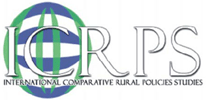Climate Change Governance and Food Security
By Polina Osipova, Patricia Teresa Fernandez Guajardo, and Lissel Hernandez Gongora
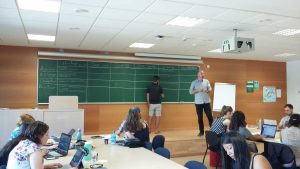
Dr. Yancy Vaillant leads debrief on Priorat field trip.
Today we began our morning reflecting on yesterday’s field trip to Priorat. During the debriefing session, each group explored the linkages between their theme (agrifood systems, rural-urban linkages, climate change and rural business), what we observed on the trip and what the local people told us. We shared our reflections with the whole group. It was a good way to recap what we learned the day before.
After that, we continued with the first morning session about the environment and climate change. We listened to Dr. James Breen explain how agriculture contributes to climate change. He also presented an overview about Irish farmers’ awareness of their GHG emissions and the challenges of addressing GHG emissions from agriculture.
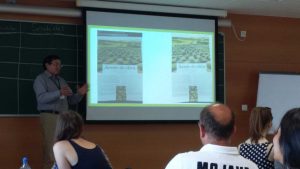
Dr. Gabino Nava-Bernal discusses the impacts of climate change on peasant farmers in Mexico
Dr. Gabino Nava-Bernal presented the impacts of climate variability on the cycle of sowing and harvesting crops. He explained the challenges that Mexican peasants face and the strategies they have adopted to address them. Finally, Dr. Thierno Thiam discussed the inadequacy of democratic institutions in addressing a complex problem such as climate change. He concluded with a provocative remark about the need to imagine and create different and better institutions.
The second session of the day introduced us to the concept of Collaborative Governance by presenting case studies in Ireland, U.S. and Canada. First, Dr. Bruno Jean spoke about the Regional County Municipality (RCM) model in Quebec which is a supra-local government that allows municipalities to work together to provide services for rural communities.
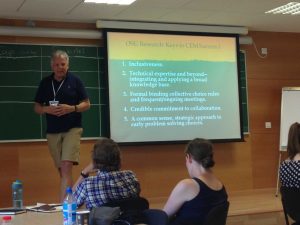
Dr. Brent Steel introduces collaborative ecosystem management
Then, Dr. Brent Steel discussed the potential of collaborative governance in rural communities in the Western U.S. to address ecological issues. Finally, Dr. Ryan Gibson presented regional development experiences in Newfoundland and Ireland in which the model of collaborative governance was implemented. The session helped us to understand the importance of Collaborative Governance to achieve consensus in decision-making and collaboration between the different stakeholders that interact in rural communities but it also encouraged us to think about the challenges that this model has in practice when different actors have their own agenda and they are used to compete rather than collaborate.
The third session of an information-packed day focused on the topics of food security, food sovereignty, and governance of food systems. Dr. Philip Loring introduced and moderated the session, bringing up the contrast between placing special value in food products that are produced in a specific place (such as champagne or Parmigiano Reggiano, for example), and the results of globalization, which has allowed for foods to be produced and sold almost anywhere in the world, prompting a separation from the value of place. Dr. John Devlin then discussed his recent research into genetically modified (GMO) corn, which focuses on why the technology has spread so rapidly in spite of widespread opposition and questions about its safety. We learned about the ways that large agrofood corporations use their financial resources to influence government, academia, and public perception. One provocative question that was raised was why there are so many resources being put into promoting and developing GMOs when traditional foods are not failing us and when the main issue with food security is not production of food but access to the food that is produced.
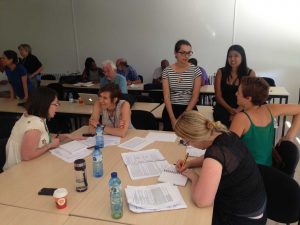
Group work: rural economic renaissance and entrepreneurship team
Next we heard from a couple of guests from a local university. Dr. Feliu Lopez Gelats, from the University of Vic-Central University of Catalonia (UVic) discussed agroecology and proposed that we can look at it as a form of resistance by peasant farmers to capitalism, placing it in the context of other resistance movements. Dr. Marta G. Rivera Ferre, also from UVic, explained that her research has found that a variety of organizations which have devised policies promoting agroecology all have different narratives about what agroecology is—none of them encompass the full meaning of agroecology.
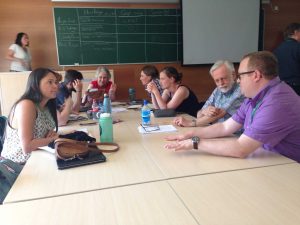
Group work: rural and urban linkages team
Finally, Dr. Victoria Soldevila introduced us to the concept of food regimes. She compared the past two food regimes with the one we are currently in, and the reasons for food insecurity in each regime, concluding that past food regimes were not able to solve the problem of food insecurity and that it does not seem that our current one will either. We ended the session with a stimulating whole-class discussion, after which the teams had some time to discuss their projects. It was a very full day at ICRPS!
